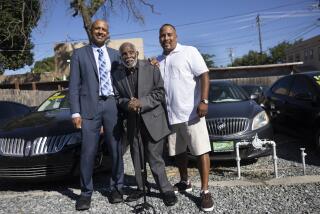Crime and Punishment--and the Civil Courts
- Share via
One of our readers has written with a provocative question: “Is there legal recourse against murderers under civil law?”
“My brother’s murderer was sentenced to prison,” the reader from Whittier continues, “but I am wondering whether we can sue him in a civil court.”
The question that suggests there may be some confusion out there about the difference between criminal and civil law. An act can be both a crime, as established by specific state or federal statues, and a civil wrong, as provided by other laws. A driver who causes an auto accident might be guilty of a crime (for example, drunk or reckless driving) and at the same time, in another courtroom, be found liable under civil law theories for the damage and injury he caused.
In a criminal case, the prosecutor, representing the people, must prove “beyond a reasonable doubt” that the defendant committed the crime in question. If convicted, the defendant is punished “as provided by law” (to quote the old “Dragnet” television series, on which each culprit was shown at the end with the sentence imposed).
That law provides some sentencing discretion to the judge, who must decide what is appropriate in each individual case. The criminal law also enables the judge, in certain cases, to order restitution, an amount to be paid by the defendant to cover the loss of the victim.
Victims of crime can also collect compensation from a government-funded victim’s fund.
There is another way for a person to seek recourse or compensation for his or her injury: through the civil courts. You can sue someone on a civil basis for a crime committed against you and seek to recover damages for your pain and suffering, as well as punitive damages.
For example, assault is both a crime and a civil tort. Torts are covered by the body of law that includes non-contractual, non-criminal legal theories.
The burden of proof, a phrase lawyers use to describe how much you have to prove to win your case, is different in a civil suit. You don’t have to win “beyond a reasonable doubt,” you only have to convince the jury by a “preponderance of the evidence.” That means you have to show that what you say took place--the assault, for example--is more likely than not to have happened as you allege.
It may also be easier to win a civil suit, because constitutional defenses that would apply in criminal court might not be applicable in a civil trail.
In a civil lawsuit, the successful plaintiff is awarded a judgment against the defendant, say $75,000. But collection of it is another matter. A judgment is not the same as money in the bank. If the defendant has applicable insurance, you might be able to recover, but if the criminal you have sued does not have any assets, or is what lawyers call “judgment proof,” the legal victory is not worth much.
In California’s civil law, there are separate provisions for “wrongful death.” The theory is that heirs of the deceased may recover for the monetary loss of present and probable future benefits. In legal talk, these might be described as the present value of future contributions, the value of personal service, advice or training that would probably have been given and the value of the deceased’s society and companionship.
So now back to the murderer. The heirs of the victim may recover. Who are they? The wife and children would be heirs. Our questioner was a brother, and the wrongful death statues do give such “collateral heirs” as brothers and sisters the right to recover if they can prove pecuniary loss or direct tangible monetary loss. Of course, if the perpetrator is sitting in prison and has no assets, winning a civil lawsuit would be nothing more than a Pyrrhic victory.
* LEGAL BRIEF: Several citizen law schools have begun programs this month to explain the law to consumers. The Beverly Hills Bar has a program on Monday nights at the Westwood United Methodist Church. For information call Barbara Avis at (310) 553-6646. The Santa Barbara Barristers Club has a program on Tuesday evenings at the Wake Center, 300 North Turnpike, and the California Chinese Lawyers Assn. begins its program in English and Chinese on Oct. 17, with six weekly classes at 9 on Saturdays a.m. at the Monterey Park City Council Chambers, 320 W. Newmark Ave., Monterey Park.
More to Read
Sign up for Essential California
The most important California stories and recommendations in your inbox every morning.
You may occasionally receive promotional content from the Los Angeles Times.













